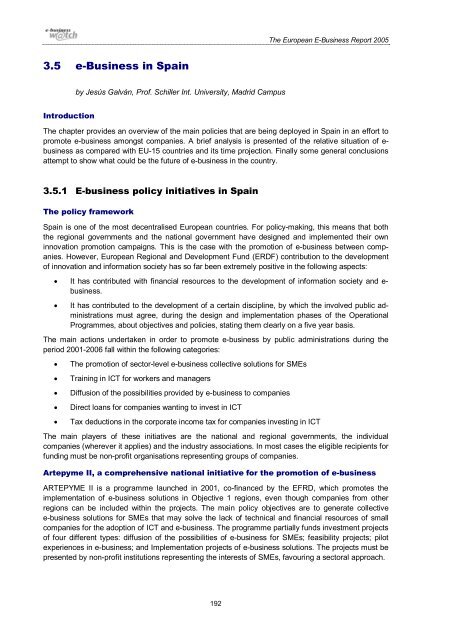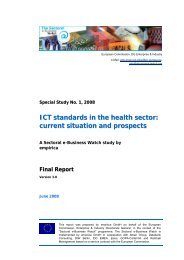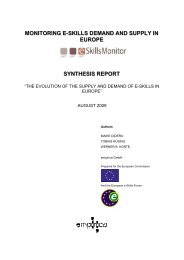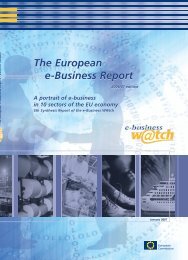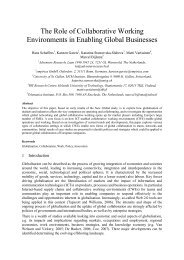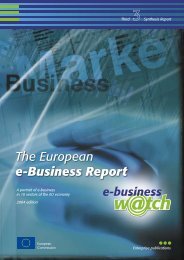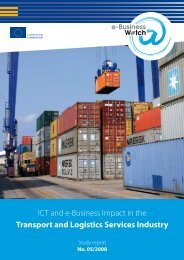The European e-Business Report The European e ... - empirica
The European e-Business Report The European e ... - empirica
The European e-Business Report The European e ... - empirica
Create successful ePaper yourself
Turn your PDF publications into a flip-book with our unique Google optimized e-Paper software.
<strong>The</strong> <strong>European</strong> E-<strong>Business</strong> <strong>Report</strong> 2005<br />
3.5 e-<strong>Business</strong> in Spain<br />
by Jesús Galván, Prof. Schiller Int. University, Madrid Campus<br />
Introduction<br />
<strong>The</strong> chapter provides an overview of the main policies that are being deployed in Spain in an effort to<br />
promote e-business amongst companies. A brief analysis is presented of the relative situation of e-<br />
business as compared with EU-15 countries and its time projection. Finally some general conclusions<br />
attempt to show what could be the future of e-business in the country.<br />
3.5.1 E-business policy initiatives in Spain<br />
<strong>The</strong> policy framework<br />
Spain is one of the most decentralised <strong>European</strong> countries. For policy-making, this means that both<br />
the regional governments and the national government have designed and implemented their own<br />
innovation promotion campaigns. This is the case with the promotion of e-business between companies.<br />
However, <strong>European</strong> Regional and Development Fund (ERDF) contribution to the development<br />
of innovation and information society has so far been extremely positive in the following aspects:<br />
• It has contributed with financial resources to the development of information society and e-<br />
business.<br />
• It has contributed to the development of a certain discipline, by which the involved public administrations<br />
must agree, during the design and implementation phases of the Operational<br />
Programmes, about objectives and policies, stating them clearly on a five year basis.<br />
<strong>The</strong> main actions undertaken in order to promote e-business by public administrations during the<br />
period 2001-2006 fall within the following categories:<br />
• <strong>The</strong> promotion of sector-level e-business collective solutions for SMEs<br />
• Training in ICT for workers and managers<br />
• Diffusion of the possibilities provided by e-business to companies<br />
• Direct loans for companies wanting to invest in ICT<br />
• Tax deductions in the corporate income tax for companies investing in ICT<br />
<strong>The</strong> main players of these initiatives are the national and regional governments, the individual<br />
companies (wherever it applies) and the industry associations. In most cases the eligible recipients for<br />
funding must be non-profit organisations representing groups of companies.<br />
Artepyme II, a comprehensive national initiative for the promotion of e-business<br />
ARTEPYME II is a programme launched in 2001, co-financed by the EFRD, which promotes the<br />
implementation of e-business solutions in Objective 1 regions, even though companies from other<br />
regions can be included within the projects. <strong>The</strong> main policy objectives are to generate collective<br />
e-business solutions for SMEs that may solve the lack of technical and financial resources of small<br />
companies for the adoption of ICT and e-business. <strong>The</strong> programme partially funds investment projects<br />
of four different types: diffusion of the possibilities of e-business for SMEs; feasibility projects; pilot<br />
experiences in e-business; and Implementation projects of e-business solutions. <strong>The</strong> projects must be<br />
presented by non-profit institutions representing the interests of SMEs, favouring a sectoral approach.<br />
192


